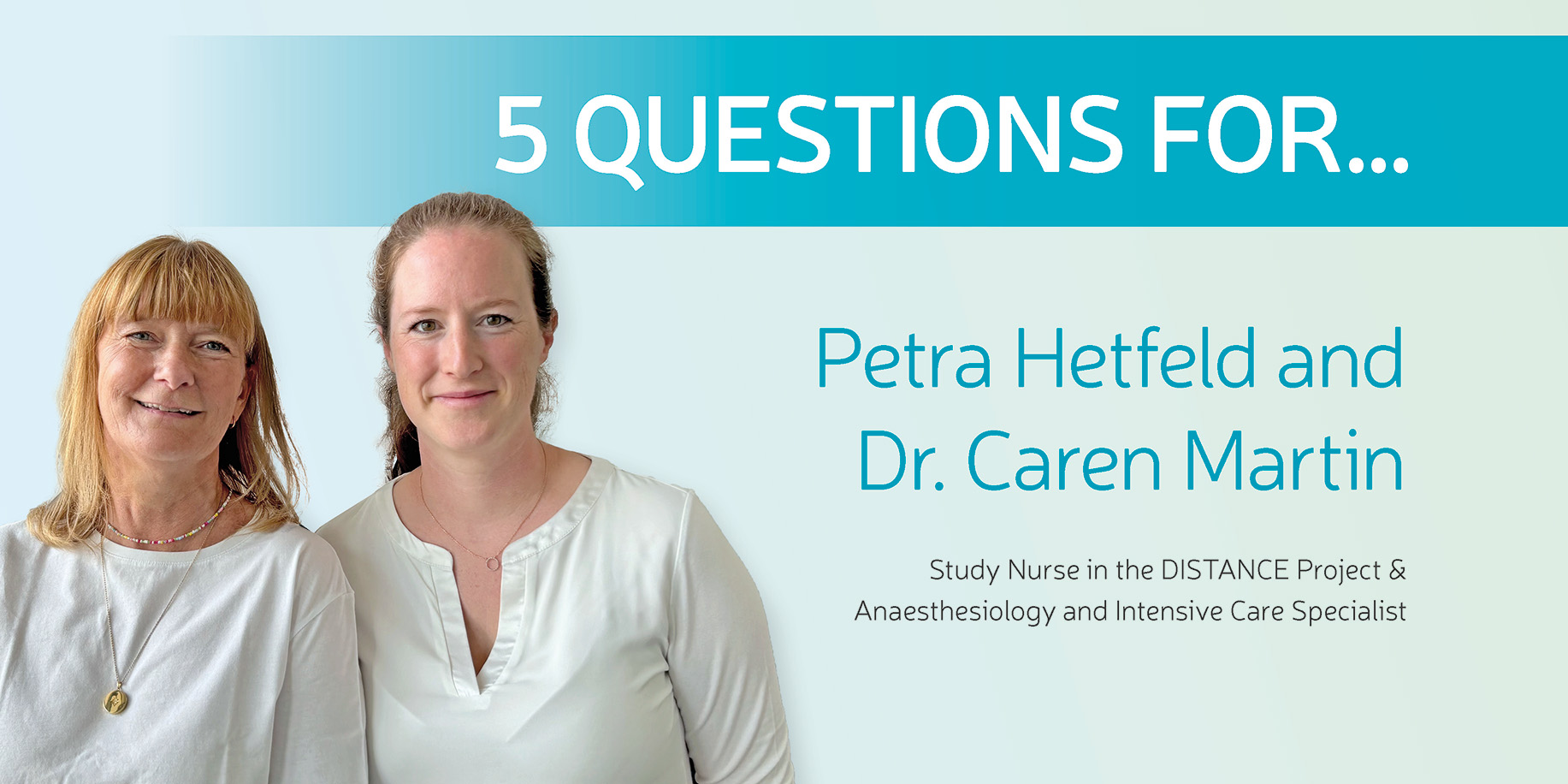
Digital Follow-Up Care After the ICU: “We Learned a Lot From Patient Feedback for Our Work”
5 Questions for … Petra Hetfeld & Dr. Caren Martin on Patient Recruitment in the DISTANCE Project
Many former intensive care patients continue to experience physical and mental health issues, such as difficulty concentrating or muscle weakness, long after their hospital stay. These symptoms are collectively referred to as “Post-Intensive Care Syndrome” (PICS) and are often associated with a reduced quality of life. The PICOS App, developed at the Digital Progress Hub DISTANCE, aims to provide better support for those affected and systematically research PICS. The app enables patients to document their health status in everyday life while simultaneously providing valuable data for research. The app is currently being tested as part of the PICOS study at ten regional healthcare facilities and clinics, including the University Hospital RWTH Aachen University. Petra Hetfeld and Dr. Caren Martin were responsible for recruiting patients for the PICOS study in Aachen. In the current “Five Questions for…” interview, they share their insights and experiences gained through direct contact with the participants.
How exactly did patients get recruited into the PICOS study?
Petra Hetfeld: We screened the intensive care units several times a week. In other words, we checked which patients met the inclusion criteria: being ventilated for at least 24 hours, being in intensive care for at least 72 hours, being over 18 years old, and being cognitively able to participate. We approached these patients, introduced them to the study and the PICOS App, and invited them to participate if they were interested. Dr. Martin handled the patient consent process. If they consented, we carried out a short initial examination. After being discharged from the hospital, participants could use the app and were invited to follow-up examinations after three, six, and twelve months.
What was your experience conducting the study and working with patients?
Dr. Caren Martin: We were pleasantly surprised by how open many patients were to health apps. They particularly appreciated the opportunity to stay in contact after their hospital stay. We saw two main groups: tech-savvy patients who were interested in using apps and wearables to track their health, and patients who were reluctant to use digital services. We also found that patients were generally very grateful for the intensive medical care they received in Aachen. They also found it useful to contribute to research through their participation.
Petra Hetfeld: The follow-up support was challenging. Many people forgot to enter data or keep appointments in their everyday lives. Personal conversations, email reminders, and phone calls helped a lot. Often, a friendly conversation was enough to motivate the participants.
What type of patients typically took part in the study?
Dr. Caren Martin: Due to the nationwide recruitment in different clinics, the group was very diverse. In Aachen, we mainly included cardiac surgery patients because they usually met the required length of stay. At other hospitals, internal or trauma surgery cases predominated. The focus was on patients over 60 years old because younger patients are less likely to require intensive care for such a long time. Even if they do, they often return to everyday life quickly and are more difficult to persuade to attend follow-up examinations or use the PICOS App.
The last patient was recruited for the study at the end of June, and the evaluation has begun. What did you personally take away from the DISTANCE project?
Petra Hetfeld: For me, it was interesting to accompany former intensive care patients for a year and witness their healing process. Usually, we never hear from patients again after they leave. This study allowed us to see how they developed over three, six, and twelve months — and how long it can really take before they can fully participate in everyday life again.
Dr. Caren Martin: As an intensive care doctor, I found it particularly interesting to hear from patients afterwards about their experiences in the hospital. They often have limited perception, especially in the ICU, due to the medication we have to give them — but they are subliminally aware of many things. We can learn a lot from their feedback for our daily work in the hospital. I am always pleased to hear from patients who feel that they are in good hands with us. It’s also important for future care concepts to recognize how health can change after discharge. When patients do well after discharge, it’s nice to see that our work has made a difference and that the people we cared for during treatment are getting their lives back.
Patients benefit from the DISTANCE project because…
Petra Hetfeld: By using the app, they can reflect on their health every day and keep track of their progress.
Dr. Caren Martin: …their data helps them better identify typical challenges in the year following intensive care treatment. This will allow us to avoid these problems in the future or treat them more effectively. In the long term, we hope to develop forecasts with the help of artificial intelligence, such as deep learning and large language models.
About the Interview Partners:
Petra Hetfeld is a study nurse at the Innovation Center for Digital Medicine at the RWTH Aachen University Hospital. She supervises clinical studies, documents study data, and supports patients throughout the duration of their studies. She also assists DISTANCE with project management.
Dr. Caren Martin is an anesthesiologist and intensive care specialist at the RWTH Aachen University Hospital. She is also involved in project work at the Innovation Center for Digital Medicine. In the DISTANCE project, she cares for patients from enrollment to follow-up, supporting project management and the evaluation of medical issues.

